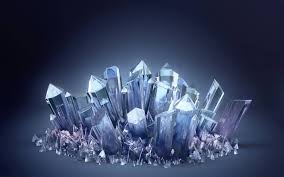crystal
英 [ˈkrɪs.təl]
美 [ˈkrɪs.təl]
- n. 结晶,晶体;水晶;水晶饰品
- adj. 水晶的;透明的,清澈的
- n. (Crystal)人名;(英)克里斯特尔,克丽丝特尔 (女名)
使用频率:

记忆方法
1. cry + st- (street) + -al (all) => 在大街上哭,眼泪掉到地上都变成了水晶。
2. crystal 可立视透 (可以立马看透) = 水晶。
2. crystal 可立视透 (可以立马看透) = 水晶。
中文词源
crystal 水晶,结晶
来自cryst-,冷,冷冻,词源同crust.
英语词源
- crystal
-
crystal: [OE] The prehistoric Indo-European base *kru- produced several words denoting ‘hard outer surface’, including English crust, Old High German hrosa ‘crust’, and Old Norse hrúthr ‘crust’. In some cases they reflect a hardening caused by freezing: Old High German hrosa, for example, also meant ‘ice’, and Greek krúos meant ‘frost’.
From this was derived krustaímein ‘freeze’, which in turn formed the basis of krústallos ‘ice’. When Old English first acquired the word, via Latin crystallum and Old French cristal, it still meant ‘ice’, a sense which survived until the 16th century, although losing ground all the time to the metaphorical extension ‘clear mineral’.
=> crust - crystal (n.)
- Old English cristal "clear ice, clear mineral," from Old French cristal (12c., Modern French crystal), from Latin crystallus "crystal, ice," from Greek krystallos, from kryos "frost," from PIE root *kru(s)- "hard, hard outer surface" (see crust). Spelling adopted the Latin form 15c.-17c. The mineral has been so-called since Old English; it was regarded by the ancients as a sort of fossilized ice. As a shortened form of crystal-glass it dates from 1590s. As an adjective, from late 14c.
权威例句
- 1. If you're a Billy Crystal fan, you'lllove this movie.
- 如果你是比利·克里斯托的影迷,你会喜爱这部影片。
- 2. Some of the finest drinking glasses are made from lead crystal.
- 一些最高档的酒杯是用铅晶质玻璃制成的。
- 3. The cliffs, lapped by a crystal-clear sea, remind her of Capri.
- 清澈的海水拍打着悬崖峭壁,令她想起了卡普里。
- 4. Remember that these are only guidelines: I don't have a crystal ball.
- 不要忘了这些只是指导方针:我不能预测未来。
- 5. Everyone must be familiar with the old favourite among roses, Crystal Palace.
- 大家一定都很熟悉玫瑰中的老牌名品“水晶宫殿”。
